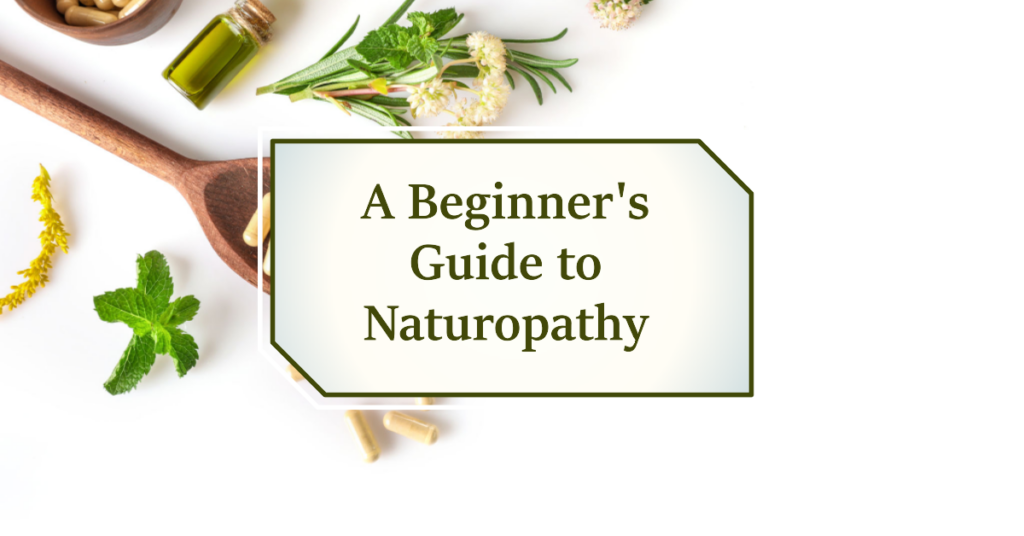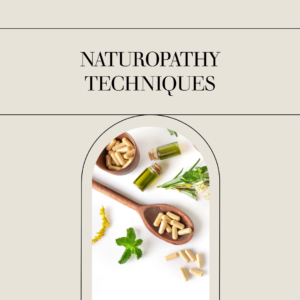A Beginner’s Guide to Naturopathy: What You Need to Know

Naturopathy is a branch of medicine that seeks to harness the body’s innate healing powers to treat illness and promote wellness. Rooted in centuries-old practices, it emphasizes prevention, holistic care, and natural remedies. As a beginner, embarking on the journey of understanding naturopathy opens doors to new perspectives on health and healing.
Understanding Naturopathy
Naturopathy is a form of alternative medicine that emphasizes the body’s intrinsic ability to heal and maintain itself. Unlike conventional medicine, which often focuses on treating symptoms, naturopathy seeks to identify and address the root causes of illness. It incorporates various therapies, including diet and lifestyle changes, herbal medicine, homeopathy, physical therapy, and stress management techniques.
The Origins of Naturopathy
Naturopathy’s roots can be traced back to ancient healing practices of various cultures, including Greek, Indian (Ayurveda), and Chinese (Traditional Chinese Medicine) medicine. However, it was only in the late 19th century that the principles of naturopathy were formalized in the western world by the likes of Benedict Lust and Sebastian Kneipp.
Naturopathy vs Traditional Medicine: Which One is for You?
Deciding between naturopathy and traditional medicine is a personal decision that depends on your health goals, personal beliefs, and specific health condition. Understanding the differences and similarities between these two approaches can help you make an informed decision.
Differences and Similarities
The primary difference between naturopathy and traditional medicine lies in their approach to treatment. Traditional medicine often focuses on treating symptoms using drugs and surgery, while naturopathy emphasizes holistic care, prevention, and natural remedies. However, both approaches value the importance of a doctor-patient relationship and aim to improve patients’ health.
Table 1: Comparison between Naturopathy and Other Healing Systems
| Healing System | Origin | Key Principle | Techniques |
|---|---|---|---|
| Naturopathy | Various cultures; formalized in the Western world | Healing power of nature; holistic approach | Dietary and lifestyle modifications, herbal medicine, homeopathy, physical therapies |
| Traditional Chinese Medicine | China | Balance of yin and yang; harmony among body, mind, and spirit | Acupuncture, herbal medicine, Tai Chi, Qigong |
| Ayurveda | India | Balance among three doshas (vata, pitta, kapha) | Dietary and lifestyle modifications, herbal medicine, yoga, meditation, Panchakarma |
Benefits of Naturopathy
Naturopathy offers several benefits, including a personalized approach to treatment, focus on prevention, and use of natural, less invasive therapies. Moreover, naturopathy seeks to empower individuals to take charge of their health and encourages a balanced lifestyle for long-term wellness.
Top 10 Home Remedies You Can Learn From Naturopathy
Naturopathy is a holistic healing practice that champions the use of natural remedies to promote overall health and well-being. Here are the top 10 home remedies inspired by naturopathy that you can easily incorporate into your daily routine.
Exploring the Power of Plants
Plants have been used as medicine for thousands of years, and naturopathy continues this tradition. Here are five common plants and their uses:
- Ginger: Known for its potent anti-inflammatory properties, ginger can be used to alleviate nausea and reduce inflammation.
- Chamomile: Often consumed as a tea, chamomile is excellent for promoting sleep and reducing anxiety.
- Peppermint: It can soothe digestive issues and relieve headaches when applied as an essential oil.
- Turmeric: With its strong anti-inflammatory and antioxidant properties, turmeric can help in managing a variety of health conditions, from joint pain to heart health.
- Lavender: Its calming scent makes it a popular choice for stress relief and sleep promotion.
The Use of Natural Remedies
In addition to plants, naturopathy also utilizes other natural substances as remedies. Here are five examples:
- Honey: Known for its antibacterial and anti-inflammatory properties, honey is excellent for wound healing and soothing sore throats.
- Apple Cider Vinegar: It aids digestion, helps control blood sugar levels, and can promote weight loss.
- Epsom Salt: Often used in baths, it can soothe aching muscles, promote relaxation, and assist with skin issues.
- Coconut Oil: A versatile remedy, it’s used for skin moisturizing, wound healing, and promoting hair health.
- Garlic: It has potent antimicrobial and immune-boosting properties, making it useful in cold and flu prevention.
How Naturopathy Can Help Alleviate Stress: A Detailed Look
In our fast-paced modern world, stress has become a common issue affecting many individuals. Naturopathy offers various techniques to help manage and alleviate stress.
Naturopathy Techniques for Stress Relief
Naturopathic stress management techniques often involve a holistic approach, addressing both the mind and body. This can include:
- Mindfulness Practices: Techniques like mindfulness meditation can help individuals stay present and focused, reducing feelings of anxiety and stress.
- Yoga: As a practice that combines physical postures with mindful breathing, yoga can help lower stress levels and promote relaxation.
- Dietary Changes: Consuming a balanced diet rich in B vitamins and magnesium can help support the body’s stress response.
- Lifestyle Modifications: Regular physical activity, adequate sleep, and reducing caffeine and alcohol can also significantly impact stress levels.
You may be interested in our article: Top 10 ways to reduce stress
Exploring the Role of Naturopathy in Managing Chronic Conditions
Chronic conditions such as diabetes, heart disease, arthritis, and many others can significantly impact an individual’s quality of life. These long-term health issues often require continuous management and care. Naturopathy, a holistic approach to health and wellness, can play a crucial role in managing these conditions by focusing on the whole person and addressing underlying imbalances.
The Holistic Approach
Unlike the conventional model of medicine that often focuses on treating specific symptoms, naturopathy takes a more comprehensive view of health. It looks at the individual’s overall lifestyle, diet, mental, and emotional well-being, and environmental factors.
For instance, in managing diabetes, a naturopath would not only focus on blood sugar levels but also consider the patient’s diet, exercise habits, stress levels, and sleep patterns. They might recommend dietary modifications, herbal supplements, and stress management techniques to support blood sugar regulation, improve insulin sensitivity, and promote overall health.
The Importance of Prevention
Prevention is a core principle of naturopathy. Rather than merely treating disease once it occurs, naturopathy emphasizes the importance of maintaining health and preventing disease. This approach can be particularly beneficial in managing chronic conditions where lifestyle factors play a significant role. Regular exercise, a balanced diet, adequate sleep, and stress management are often recommended to prevent the onset or progression of chronic conditions.
The Benefits of Naturopathy for Mental Health: A Comprehensive Review
Mental health is an essential aspect of overall health. The interconnectedness of the mind and body is a fundamental principle of naturopathy, and it offers various strategies to support mental health.
Naturopathy and Mental Wellness
Naturopathy views mental health as an integral part of overall wellness and seeks to support it through various modalities. This can include dietary and lifestyle recommendations, herbal medicine, and mind-body techniques like mindfulness and meditation.
For example, a naturopath might recommend omega-3 fatty acids and vitamin B12 for their brain-supporting benefits or suggest certain herbal teas to promote relaxation and reduce anxiety.
How Naturopathy Supports Mental Health
Naturopathy supports mental health by promoting balance in the body and mind. This can involve addressing nutritional deficiencies, supporting gut health (which is closely linked to mental health), promoting quality sleep, and providing strategies to manage stress.
Research has shown that gut health is closely linked to mental health due to the gut-brain axis. A naturopath might recommend a diet rich in fiber and fermented foods to support a healthy gut microbiome, which in turn could help to improve mental well-being.
Furthermore, sleep quality is often addressed in naturopathic care, with recommendations for regular sleep schedules and natural remedies for insomnia such as valerian root or chamomile tea.
The comprehensive and preventative approach to health in naturopathy can be particularly beneficial for mental health, providing individuals with the tools and strategies they need to maintain their mental well-being.
Boost Your Health with Naturopathy Diet Plans: A Step-By-Step Guide
Diet and nutrition play a significant role in naturopathy, influencing both your physical health and emotional well-being. Naturopathy recognizes that each person is unique, and so their dietary needs may vary. Here’s a step-by-step guide to boosting your health with naturopathy diet plans.
The Naturopathy Diet
The naturopathy diet emphasizes whole, unprocessed foods that nourish the body, support healing, and help maintain optimal health. It typically includes a variety of fresh fruits and vegetables, whole grains, lean proteins, and healthy fats, along with a focus on hydration with plenty of water. This diet plan also encourages mindful eating – taking the time to enjoy and savor your food rather than rushing through meals.
The goal is to reduce inflammation, support the body’s natural detoxification processes, and provide essential nutrients for overall health. While the naturopathy diet limits processed foods, sugars, unhealthy fats, and excessive caffeine, it also recognizes the importance of balance and moderation.
How to Start a Naturopathy Diet
Starting a naturopathy diet involves making gradual, sustainable changes to your eating habits. Here’s a step-by-step guide:
- Assess Your Current Diet: Before making any changes, it’s helpful to take a close look at your current eating habits. You could keep a food diary for a week, noting what and when you eat, as well as any symptoms you experience after eating, such as bloating or fatigue.
- Add More Whole Foods: Start by incorporating more whole foods into your meals. This could mean adding more fruits and vegetables to your dishes, choosing whole grains instead of refined ones, and opting for lean proteins like fish or poultry.
- Reduce Processed Foods: Gradually reduce your intake of processed foods, which often contain unhealthy fats, added sugars, and high levels of sodium. Instead, opt for fresh, natural foods as much as possible.
- Stay Hydrated: Drink plenty of water throughout the day to support digestion and overall health. Herbal teas can also be a good choice.
- Consult with a Naturopathic Practitioner or Nutritionist: Each person’s dietary needs are unique, and a one-size-fits-all approach may not be effective. Therefore, consider consulting with a naturopathic practitioner or nutritionist who can provide personalized advice and develop a diet plan that meets your specific health needs and lifestyle.
Remember, the transition to a naturopathic diet is a journey, not a race. It’s about making sustainable changes that you can maintain in the long term to support your overall health and well-being.
The History of Naturopathy: An Intriguing Journey
The philosophy and practice of Naturopathy have ancient origins, with principles dating back to the healing practices of various cultures.
Ancient Influences of Naturopathy
The Greeks, particularly Hippocrates, have greatly influenced Naturopathy. Known as the father of medicine, Hippocrates believed in the healing power of nature, a principle that aligns directly with Naturopathy. He advocated for a holistic approach, considering the whole person—body, mind, and spirit—in diagnosis and treatment.
Chinese Traditional Medicine (CTM) and Ayurveda from India are also significant influencers of Naturopathy. Both these ancient systems approach health and illness from a holistic perspective, emphasizing balance and harmony. CTM uses concepts of yin and yang, and the five elements to explain health phenomena, while Ayurveda considers the individual’s constitution (doshas) to diagnose and treat ailments.
Modern Naturopathy
The formalization of Naturopathy in the Western world began in the late 19th and early 20th centuries. Two important figures during this time were Sebastian Kneipp and Benedict Lust.
Sebastian Kneipp, a Bavarian priest, is known for his hydrotherapy treatments and the ‘Kneipp Cure’, which involves a combination of water treatments, herbs, exercise, and diet. His philosophy greatly influenced Benedict Lust, often referred to as the father of U.S. naturopathy. Lust expanded Kneipp’s principles and established the first naturopathic college in New York in 1901. He also introduced practices like homeopathy, spinal manipulations, and nutritional therapy into the naturopathic framework.
Over the years, Naturopathy has evolved and incorporated various techniques and modalities, but the fundamental principles remain the same, emphasizing prevention, holistic treatment, and the healing power of nature.
Lose Weight Naturally: How Naturopathy Can Help
Weight loss is a universal concern, with people constantly seeking out sustainable, effective solutions. Naturopathy offers a holistic approach that goes beyond just shedding pounds—it aims to create a balanced and healthy lifestyle that supports long-term weight management.
Naturopathy and Weight Loss
Naturopathy is unique in the realm of weight loss strategies. Unlike fad diets and quick fixes that often lead to temporary results and potential health risks, naturopathy encourages a holistic, balanced, and sustainable approach to weight loss. It’s about creating a lifestyle that you can maintain in the long run.
Naturopathy focuses on the root causes of weight gain, which can include factors such as hormonal imbalances, chronic inflammation, poor gut health, and high stress levels. By addressing these underlying issues, naturopathy can help individuals achieve and maintain a healthy weight.
A naturopathic approach to weight loss includes:
- Healthy Diet: Naturopathy advocates for a balanced diet rich in whole foods. This includes plenty of fresh fruits and vegetables, lean proteins, healthy fats, and whole grains. Processed foods, high-sugar foods, and unhealthy fats are minimized.
- Regular Physical Activity: Regular exercise is crucial for weight loss and overall health. A naturopathic approach encourages incorporating physical activities that you enjoy into your routine, making it more likely to stick with it.
- Stress Management: High stress levels can lead to weight gain by disrupting hormonal balance and promoting unhealthy eating habits. Techniques such as yoga, meditation, and deep breathing exercises can help manage stress levels.
- Adequate Sleep: Poor sleep quality and quantity can interfere with the body’s metabolism and appetite regulation, leading to weight gain. Good sleep hygiene practices are therefore essential for weight management.
Case Studies: Success Stories in Weight Loss
Naturopathy’s approach to weight loss has helped numerous individuals achieve their weight loss goals and maintain them in the long term.
For instance, consider the story of a middle-aged woman who struggled with obesity for many years. Traditional diets and exercise regimens had not provided her with lasting results. When she turned to naturopathy, she started by having a comprehensive evaluation to understand the root causes of her weight gain, which turned out to be a combination of hormonal imbalance, chronic stress, and poor gut health.
Following her naturopath’s advice, she made significant changes to her diet, focusing on nutrient-rich whole foods and eliminating processed foods. She started practicing yoga and meditation to manage her stress levels and improve her sleep. She also took natural supplements to improve her gut health.
Over time, she noticed not only a significant weight loss but also an overall improvement in her energy levels, mood, and general well-being. Most importantly, she was able to maintain her weight loss because the changes she made were sustainable and became part of her lifestyle.
This is just one of many success stories demonstrating how naturopathy can support weight loss. The key takeaway is that naturopathy offers a holistic, personalized, and sustainable approach to weight management, focusing on overall well-being rather than just the number on the scale.
Top Techniques in Naturopathy: A Comprehensive Overview
Naturopathy is a broad field of alternative medicine that employs a wide array of techniques to promote overall health and wellness. By focusing on the body’s inherent healing abilities, naturopathy encourages natural recovery and sustainable well-being. Here is an expanded look at some of the primary techniques used in this practice.
Dietary and Lifestyle Modifications
Dietary and lifestyle modifications are foundational to naturopathic treatment, with practitioners recognizing that what we eat and how we live significantly impact our health. Personalized advice on diet can help individuals address nutrient deficiencies, manage allergies, control weight, and boost overall wellness.
Exercise recommendations are tailored to the individual’s abilities and preferences, aiming to improve cardiovascular health, strengthen muscles, enhance mood, and increase energy levels.
Sleep and stress management are also integral to this holistic approach. Naturopaths understand that chronic stress and insufficient sleep can lead to a multitude of health problems, from hormonal imbalances to weakened immunity. Techniques like mindfulness, meditation, and good sleep hygiene practices are often recommended to manage these aspects.
Herbal Medicine
Herbal medicine has been used for centuries across various cultures, and it forms a crucial part of naturopathic practice. Naturopaths employ a wide array of plants and plant extracts, each with unique healing properties. From enhancing digestion with ginger to easing anxiety with chamomile, these natural remedies offer a gentler alternative to pharmaceutical drugs.
Homeopathy
Originating in the late 18th century, homeopathy is a key component of naturopathy. It operates on the principle of “like cures like”—the idea that a substance causing symptoms in a healthy individual can, when highly diluted, treat similar symptoms in a sick person.
For instance, coffee is known to cause sleeplessness, but according to homeopathic principles, very diluted coffee (or Coffea Cruda in homeopathic nomenclature) could be used to treat insomnia.
Physical Therapies
Physical therapies are another cornerstone of naturopathic treatment. Techniques like massage and acupuncture can help manage pain, improve circulation, and promote relaxation.
Massage therapy encompasses a variety of techniques, from Swedish massage to deep tissue massage, to help ease tension, reduce stress, and promote relaxation.
Acupuncture, a practice borrowed from Traditional Chinese Medicine, involves inserting thin needles at specific points on the body. It’s often used to treat pain, but can also help with issues like stress management and digestive problems.
Hydrotherapy, which involves the use of water (hot, cold, steam, ice) to relieve discomfort and promote physical well-being, is another physical therapy often used in naturopathy.
By understanding these core techniques in naturopathy, individuals can make informed decisions about their health and well-being, fully embracing the healing power of nature.
Natural Skin Care: How Naturopathy Can Enhance Your Beauty
Naturopathy provides a holistic, all-natural approach to skin care that focuses on promoting skin health from the inside out. Instead of relying on topical creams and treatments, it encourages the nourishment of skin through a healthy diet, lifestyle changes, and natural remedies. Here’s a deeper look:
The Naturopathic Approach to Skin Care
Dietary and Lifestyle Modifications: In naturopathy, it is believed that our diet and lifestyle play a significant role in our skin health. Consuming a balanced diet rich in antioxidants, vitamins, and minerals can nourish the skin from within. Regular exercise, proper hydration, and adequate sleep are equally important, as they help to flush out toxins and promote skin regeneration.
Herbal Medicine: Herbal remedies are often used in naturopathy to treat various skin conditions. For instance, chamomile and aloe vera have soothing properties, making them ideal for inflammatory skin conditions like eczema or rosacea. Tea tree oil is renowned for its antimicrobial properties, which can be beneficial for acne-prone skin.
Natural Skin Care Products: Naturopathy encourages the use of skin care products that are free from harsh chemicals and synthetic ingredients. Instead, it promotes products that are made with natural, plant-based ingredients that are kinder to the skin and the environment.
By addressing the root causes of skin issues, such as poor nutrition, stress, or hormonal imbalances, naturopathy aims to enhance your natural beauty without the need for invasive procedures or synthetic products.
How To Have Healthy Skin With Naturopathy : Q & A
Inspiring Success Stories in Naturopathy: Real People, Real Results
Inspiring success stories in naturopathy are plentiful. They serve to illustrate the effectiveness of naturopathy in addressing a variety of health concerns.
Seeing A Naturopathic Doctor
Naturopathy vs Ayurveda: A Comparative Analysis
Naturopathy and Ayurveda are two distinct yet complementary systems of natural medicine that have been used for centuries to promote health and wellbeing. Each system has its own unique set of principles and practices, and while they share some similarities, there are also key differences that set them apart. Here’s a comprehensive comparative analysis:
Origins and Principles
Naturopathy: Rooted in Western philosophy, naturopathy emphasizes the body’s innate self-healing capabilities. It promotes a holistic approach to health and well-being, focusing on treating the whole person – body, mind, and spirit. The guiding principles of naturopathy include “First, do no harm,” “Treat the cause,” and “Prevention is the best cure.”
Ayurveda: Ayurveda, meaning “science of life” in Sanskrit, is a traditional Indian system of medicine that dates back over 5000 years. It centers on balancing the body’s energies, or doshas (Vata, Pitta, Kapha), to maintain health and prevent illness. Ayurveda views health as a state of balance between these doshas, and illness as an imbalance.
Practices
Naturopathy: Naturopathy uses a variety of natural therapies, including nutrition and lifestyle counseling, herbal medicine, homeopathy, hydrotherapy, and physical therapies. Treatment is individualized based on the patient’s unique needs and circumstances.
Ayurveda: Similar to naturopathy, Ayurveda also uses dietary and lifestyle modifications and herbal medicine. However, Ayurveda goes a step further with unique practices such as Panchakarma (a detoxification process), yoga, meditation, and the use of specific Ayurvedic herbs and formulas. It also involves specialized treatments like Shirodhara (pouring of warm oil on the forehead) and Abhyanga (therapeutic oil massage).
Application
Naturopathy: Naturopathy can be used to address a wide range of health concerns, from acute conditions like colds and flu to chronic diseases like diabetes and heart disease. It emphasizes prevention and encourages individuals to take responsibility for their own health.
Ayurveda: Ayurveda also addresses a broad spectrum of health conditions. It is particularly renowned for its effective management of chronic conditions and for preventive health care. Ayurveda provides detailed guidelines on daily and seasonal routines, diet, behavior, and the proper use of senses to lead a healthy and balanced life.
The choice between naturopathy and Ayurveda often boils down to individual preferences, beliefs, and needs. Some people may resonate more with the principles of one system over the other. It’s also important to note that these two systems can complement each other and can be used together in a comprehensive approach to health and wellness.
Naturopathy Treatments for Common Ailments: An Expert’s Guide
Naturopathy offers a holistic and natural approach to treating a variety of common ailments, focusing on the root cause rather than just the symptoms. Here’s an in-depth look at how naturopathy can help with digestive issues, stress and anxiety, and skin conditions.
Naturopathy for Digestive Issues
Digestive problems such as bloating, indigestion, irritable bowel syndrome (IBS), and constipation are widespread. Naturopathy approaches these issues by identifying and addressing the underlying causes, which can include dietary triggers, stress, and gut flora imbalances.
- Dietary and lifestyle modifications: A naturopath may recommend eliminating potential trigger foods, such as dairy, gluten, or certain types of sugar. They may also advise on increasing fiber intake, regular exercise, and proper hydration to support healthy digestion.
- Probiotics: Probiotics, or beneficial bacteria, play a crucial role in maintaining gut health. They can help rebalance the gut flora, which is often disrupted in people with digestive issues.
- Herbal remedies: Certain herbs, such as peppermint, ginger, and fennel, have been traditionally used to alleviate digestive discomfort. They can be taken as teas, tinctures, or in capsule form.
Naturopathy for Stress and Anxiety
Stress and anxiety are prevalent in today’s fast-paced society. Naturopathy offers several tools to help manage these conditions naturally.
- Mindfulness and yoga: These practices can help calm the mind, improve focus, and reduce stress levels. They teach individuals how to stay present and deal with stressors more effectively.
- Herbal remedies: Herbs like chamomile, valerian, and passionflower are known for their calming properties and can help manage symptoms of stress and anxiety. It’s important to remember that while these herbs can be helpful, they are not a substitute for professional mental health treatment.
Naturopathy for Skin Conditions
Naturopathy can also offer solutions for common skin conditions like acne, eczema, and psoriasis.
- Dietary changes: Food sensitivities or allergies can often manifest as skin problems. A naturopath might recommend an elimination diet to identify potential triggers.
- Herbal remedies: Certain herbs, such as calendula, chamomile, and aloe vera, are known for their skin-soothing properties and can be used topically to ease symptoms of various skin conditions.
- Natural skin care products: Naturopaths often recommend natural skin care products that are free from harsh chemicals and synthetic fragrances. These products, which often contain beneficial plant extracts, can be gentler on the skin and less likely to cause irritation.
Remember, while naturopathy can provide relief for these common ailments, it’s always important to consult with a healthcare provider for serious or persistent symptoms.
Table 2: Common Ailments and Naturopathic Treatments
| Common Ailment | Naturopathic Treatment |
|---|---|
| Digestive issues (bloating, indigestion, IBS) | Dietary and lifestyle modifications, probiotics, herbal remedies |
| Stress and anxiety | Mindfulness, yoga, herbal remedies (chamomile, valerian) |
| Skin conditions (acne, eczema, psoriasis) | Dietary changes, herbal remedies, natural skin care products |
Exploring Career Options in Naturopathy: What You Need to Know
A career in naturopathy can be rewarding and fulfilling. Here’s what you need to know about the different career options in this field.
Private Practice
Many naturopaths choose to work in private practice, where they can provide individualized care to their clients.
Health Centers
Some naturopaths work in health centers, where they collaborate with other health professionals to provide comprehensive care.
Corporate Wellness Programs
Naturopaths can also work in corporate wellness programs, helping to promote health and wellness in the workplace.
Teaching and Research
For those with a passion for teaching or research, opportunities exist in naturopathic colleges and research institutions.
Product Development
With the growing interest in natural health products, some naturopaths work in product development, creating new natural health products or supplements.
Why You Should Consider Getting a Naturopathy Certification: Top Benefits
Getting a naturopathy certification can open up a world of opportunities. Here are the top benefits of becoming a certified naturopath.
Career Benefits
A naturopathy certification can open up a wide range of career opportunities, from private practice to roles in health centers, spas, and even corporate wellness programs. It can also provide a foundation for further specialization in areas like nutrition, herbal medicine, or homeopathy.
Personal Benefits
On a personal level, a naturopathy certification can empower you with the knowledge and skills to take charge of your health and the health of your loved ones. It can also provide a deeper understanding of the body’s healing processes and the role of lifestyle factors in health and wellness.
Naturopathic Practitioner vs. Naturopathic Doctor: Understanding the Difference
While both naturopathic practitioners and naturopathic doctors work within the realm of natural medicine, their scope of practice, education, and training can differ significantly.
Naturopathic Practitioners (NP)
Naturopathic practitioners typically complete a training program in naturopathy, such as the Naturopathy Practitioner Training Course offered by Scholistico. These programs often cover a broad range of natural healing methods and philosophies, including nutrition, herbal medicine, homeopathy, and lifestyle counseling.
Naturopathic practitioners focus on holistic, preventative care, guiding individuals towards healthier lifestyles and natural remedies to support their well-being. However, their capacity to diagnose and treat medical conditions may be limited compared to NDs, depending on regional regulations.
Naturopathic Doctors (ND)
Naturopathic Doctors, on the other hand, undertake a more rigorous path of education. To become an ND, one must complete a four-year undergraduate degree, typically in a science field, followed by a four-year, graduate-level naturopathic medical school.
This extensive training includes biomedical sciences, naturopathic philosophies, therapeutic modalities, and clinical training. NDs are trained to diagnose and treat medical conditions, order lab tests, and sometimes prescribe medications, depending on regional regulations. Their approach to treatment remains holistic, aiming to address the root cause of illness rather than just treating symptoms.
In summary, both naturopathic practitioners and doctors play essential roles in holistic healthcare. However, the depth of their training and the scope of their practice can vary, with NDs usually having a wider range of clinical capabilities due to their comprehensive medical education.
Pathway to Becoming a Naturopathy Practitioner: A Comprehensive Guide
Contemplating a career in naturopathy? Here is your comprehensive guide to setting foot in this field.
Step 1: Delve into the World of Naturopathy
Embarking on your career journey begins with a solid understanding of naturopathy. Familiarize yourself with the core principles of naturopathy, get insights into the role of a naturopathy practitioner, and explore the array of career paths within this field. Scholistico offers a range of insightful blog articles that can help deepen your understanding, such as the comparison of Naturopathy vs. Conventional Medicine.
Step 2: Pursue Your Education and Training
Once you’ve gained a strong grounding in the field, the next step is to acquire the necessary education and training. This usually involves earning a degree in a health-related field, followed by a postgraduate program in naturopathy. Scholistico offers a comprehensive Naturopathy Practitioner Training Course that provides a thorough grounding in naturopathy.
It’s essential to understand the difference between a naturopathy practitioner and a naturopathic doctor (ND); while both work in the realm of natural medicine, their training and scope of practice may vary.
Step 3: Gain Practical Experience
After completing your education, it’s vital to gather hands-on experience. This could involve working under an experienced naturopathy practitioner or in a health and wellness center, where you can apply and refine the skills you’ve learned.
Step 4: Obtain Certification
The final stage is to earn your certification. Respected bodies such as the International Practitioners of Holistic Medicine, the Centre of CPD Excellence, and the Complementary Medical Association offer various certification programs. Gaining certification not only enhances your professional credibility but also ensures that you meet the requisite standards of practice within the naturopathy field.
Becoming a Naturopathic Doctor: A Detailed Guide
If you’re considering a more specialized career in naturopathy as a Naturopathic Doctor (ND), here’s a detailed guide to help you navigate the process.
Step 1: Understand the Role of a Naturopathic Doctor
Naturopathic Doctors (NDs) are healthcare practitioners who combine the wisdom of nature with rigorous modern medical training. They focus on holistic, proactive prevention and comprehensive diagnosis and treatment, utilizing protocols that minimize the risk of harm. In contrast to naturopathic practitioners, NDs undergo extensive medical training that allows them to diagnose diseases, order laboratory testing, and prescribe medication in some jurisdictions.
Step 2: Complete an Undergraduate Degree
Your journey to becoming an ND starts with a bachelor’s degree. Most ND programs require a bachelor’s degree for admission, usually in a science-related field like biology or chemistry.
Step 3: Attend a Naturopathic Medical School
Once you’ve completed your undergraduate degree, you’ll need to attend a naturopathic medical school. These programs typically take four years to complete and cover biomedical sciences, naturopathic philosophy, and therapeutic modalities, along with supervised clinical training. The Association of Accredited Naturopathic Medical Colleges (AANMC) provides information about accredited programs in North America.
Step 4: Pass the NPLEX Examination
After completing your naturopathic medical education, you will need to pass the Naturopathic Physicians Licensing Examinations (NPLEX), the passage of which is required to practice as a licensed ND in North America. The North American Board of Naturopathic Examiners (NABNE) administers the NPLEX.
Step 5: Obtain Licensure
After passing the NPLEX, you can apply for licensure in the state or province where you wish to practice. Licensing requirements can vary, so it’s important to check with the local regulatory board. In the United States, you can check the American Association of Naturopathic Physicians (AANP) for more information.
Step 6: Continued Learning and Specialization
Once you’re a practicing ND, you can choose to continue learning and specialize in a specific area of naturopathy, such as women’s health, oncology, or pediatrics. This usually involves additional coursework and certification.
Remember, the journey to becoming an ND is demanding, but the reward of helping patients achieve optimal health using natural therapies can be well worth the effort.
Your Questions Answered: An FAQ on Naturopathy
To conclude, here are answers to some frequently asked questions about naturopathy.
While both naturopaths and conventional doctors aim to help their patients achieve and maintain good health, they use different approaches. Naturopaths focus on promoting the body’s self-healing capabilities and use natural therapies, while conventional doctors typically use pharmaceuticals and surgery to treat symptoms.
How does a naturopath diagnose health issues?
Naturopaths use a variety of diagnostic techniques, including detailed health history, physical examination, and laboratory tests. They also consider factors like diet, lifestyle, and emotional well-being.
Can naturopathy help with chronic conditions?
Yes, naturopathy can be very effective in managing chronic conditions like heart disease, diabetes, and arthritis. It focuses on addressing the underlying causes of these conditions, rather than just treating the symptoms.
Is naturopathy safe?
Yes, when practiced by a trained and qualified practitioner, naturopathy is safe. Naturopaths are trained to recognize conditions that require conventional medical intervention and to refer patients to other healthcare providers when necessary.
How can I find a qualified naturopath?
To find a qualified naturopath, you can use the directories provided by naturopathic professional organizations. You should also check the practitioner’s credentials and training.



















Enjoying reading the different ways to heal the mind body. You don’t have to use medicines, but you can use natural herbs. You can focus on the overall lifestyle mental, and emotional wellbeing. Understand the way the ways and herbs are use will help you have a heather way of life.